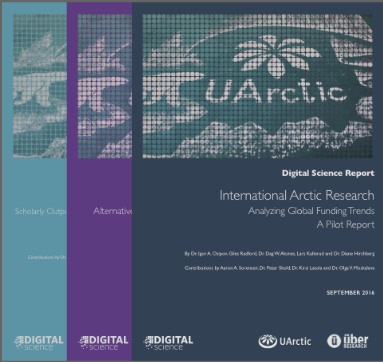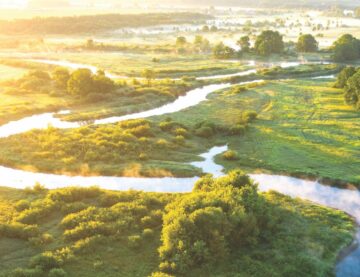Digital Science and University of the Arctic Announce Collaborative Partnership to Provide New Research Insights for the Arctic Region
First report analyzes funding landscape for Arctic-related research, based on open data on funding and publications
London, UK & LAPLAND: Wednesday 14th September 2016: Digital Science, a research-driven technology company serving scientific and research communities and the University of the Arctic (UArctic) a co-operative network of more than 170 universities, colleges and research institutes concerned with higher education and research in and around the northern Arctic region, have entered into a joint strategic partnership to obtain new insights for Arctic-related research.
The two organizations will jointly conduct research and analysis based on global funding and publication data; this project is the first ever attempt to create a comprehensive view of global Arctic research funding using a dataset of such magnitude. The UArctic aims to build and strengthen collective resources and collaborative infrastructure by the provision of unique educational and research opportunities through collaboration within a powerful network of members.
As a result of the partnership, a Digital Science and UArctic Science & Research Analytics Task Force, formed expert group, led by Dr. Igor Osipov (FEFU) have co-authored a report, “International Arctic Research – Analyzing Global Funding Trends” to assess the global funding landscape around Arctic-related research for the decade spanning 2006 – 2015.
The report uses the funding data from the Dimensions dataset, created by Digital Science portfolio company ÜberResearch. It includes information from over 200 research funders on more than 2,500,000 projects with funding totaling $1 trillion US dollars. For this research, special attention was given to analyzing trends in the countries of the Arctic Council as well as their key funding agencies and institutional members of the UArctic. Using sophisticated Natural Language Processing technology, a significant effort was made around creating and refining subject area categories and removing irrelevant grants that showed up in the searches.
The key findings of the pilot report, based on the available data, highlight the following trends:
• Arctic research accounts for approximately 1% of all funded research in the database.
• The proportion of funding dedicated to Arctic research is stable over time, at about 1%.
• “Earth Sciences” is the largest proportion of Arctic research funding, specifically due to funding attributed to ‘Oceanography’.
• Approximately 50% of all global Arctic research represented in this funding data is undertaken by researchers from UArctic member institutions.
Two supplementary working papers have also been created:
-
Arctic Altmetrics – Alternative Perspectives on the Impact of Arctic Research in conjunction with Altmetric, which tracks and analyses the online activity around scholarly literature.
-
Arctic Research Publications – Scholarly Output Trends
Lars Kullerud, President of the UArctic: “The Arctic has become one of the few transnational arenas for collaboration, discussion and mutual interest among leading global players. Joint efforts by the Arctic Council member states: USA, Canada and the Nordic Countries together with observer states China, Korea, Japan and several European nations signify the Arctic Cooperation as a truly international and interdisciplinary laboratory for partnership and building understanding. Access to a dataset of this magnitude allows us to determine whether Arctic research funding priorities match the most critical challenges facing the Arctic as identified by the scientific, and local communities and to identify who are the main actors.”
Christian Herzog, CEO of ÜberResearch explained: “The Dimensions database allows UArctic to look into the future as it provides a clear view on the research which will be undertaken in Arctic research in the forthcoming years. These ongoing research projects will not be evidenced in publications for several years to come, but our data give research funders and government organizations the ability to analyze the direction of scientific and academic research – providing a unique opportunity to influence the resource distribution in real time.”
About the University of the Arctic (UArctic)
UArctic is a cooperative network of universities, colleges, research institutes and other organizations concerned with education and research in and around the North. UArctic builds and strengthens collective resources and collaborative infrastructure that enables member institutions to better serve their constituents and their regions. Through cooperation in education, research and outreach we enhance human capacity in the North, promote viable communities and sustainable economies, and forge global partnerships.
For more information, visit www.uarctic.org and follow @uarctic on Twitter
About ÜberResearch
ÜberResearch is a leading provider of software solutions focused on helping funding organizations, non-profits, and governmental institutions make more informed decisions about science funding. The company’s cloud-based platform provides better views of an organization’s grant data, peer organization activities, and the data of the funding community at large.
For more information, visit www.uberresearch.com and follow @uberresearch on Twitter.
About Digital Science
Digital Science is a technology company serving the needs of scientific and research communities, at the laboratory bench or in a research setting. It invests in and incubates scientific software companies that simplify the research cycle, making more time for discovery. Its portfolio companies include a host of leading and admired brands including Altmetric, BioRAFT, Figshare, Labguru, Overleaf, ReadCube, GRID, TetraScience, Symplectic and ÜberResearch. It is operated by global media company, Holtzbrinck Publishing Group.




